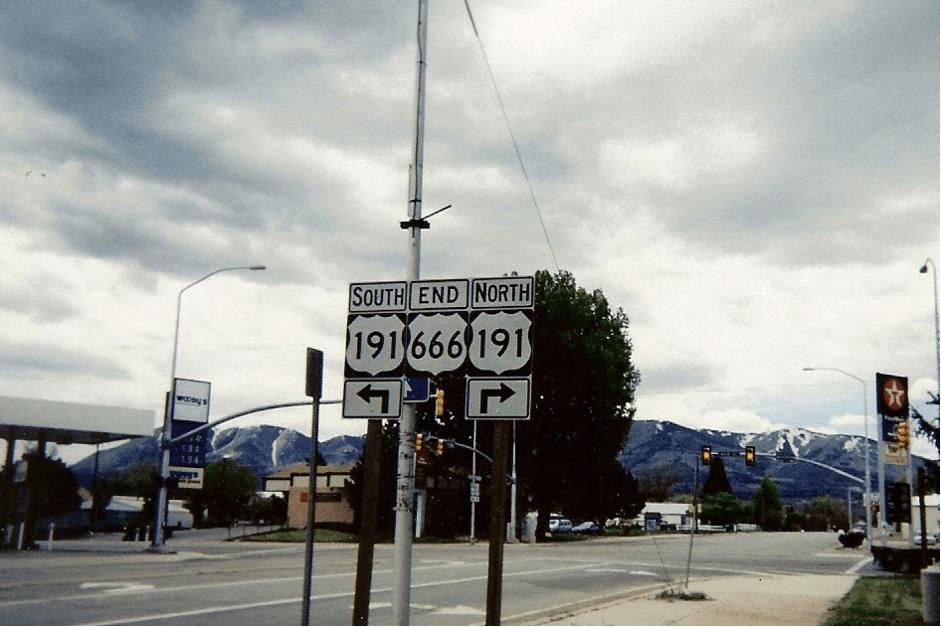Route 66 is perhaps the most famous road on all of planet Earth, but add a single digit to that and one finds another road with a far more sinister history. Route 666 began its life in 1926, when it was christened so for no other reason than to follow the numbering guidelines set out by the American Association of State Highway Officials. Spanning almost 200 miles, Route 666 crossed a total of three states (New Mexico, Colorado and Utah). Decades passed with the route staying as it was until a decision was made jointly by all the states involved that the number be changed. Today, the same road is referred to officially as U.S. Route 491 (despite being known colloquially among locals as ‘Devil’s Highway’).
Two reasons motivated this change. The first, predictably, was the high frequency of the signs being stolen by souvenir hunters. The second however, was an emerging public hysteria that the route was cursed. An officer for the Utah Highway Patrol who was frequently assigned to the route stated: “Triple six is evil. Everyone dies on that highway”. The rumours of a cursed road snowballed to the point that the route was even briefly featured in the 1994 Oliver Stone film, ‘Natural Born Killers’. Eventually, stories of a cursed road became increasingly fantastical to the point they were dominated by tales of a homicidally insane truck driver.
Most encounters with Route 666’s mad trucker ran the same way – a car, typically occupied by the driver alone and travelling late at night, would be confronted by a truck (itself moving at speeds well above 100 miles per hour) approaching them along the centre of the road. Some descriptions would go even further and describe the truck as being engulfed in flames. If the driver was lucky, they would merely swerve off the road; if they were unlucky, then the encounter would end with a fatal crash. So, is the trucker a demon summoned from Hell attracted to the highway’s Satanic number? Or are they a deranged individual seeking to inflict harm on others as part of a macabre joke?
In all likelihood, neither is the case. As enthralling as such anecdotes surely are, they are not reinforced by actual data. Prior to the route’s renaming in 2003, its fatality rates along the Utah and Colorado sections were actually lower than their respective state averages for highways. While the fatality rate for the New Mexico section was higher than the state average, this is more likely due to the fact the aging road was not equipped to handle the heavy loads which were being carried across it at the time. A further argument advocated in favour of the existence of the mad trucker is that the fatality rates for the road in all three states significantly declined after the route was renamed. However, the route was renamed as part of an ongoing federal effort to improve America’s highways, and was accompanied by increased highway maintenance and safety measures. It is more likely that this, not the change in number, were responsible for the road’s newfound safety.
While ‘Route 666’ is certainly a very memorable name for a road, it is far from the only example of its kind – there are several other roads around the world that bear the same number but have shown no evidence of their own demonic truckers. The Republic of Ireland’s ‘R666’ road transports motorists from County Cork to County Waterford. Canada’s ‘Alberta Highway 666’ is essential for commutation through the Wapiti River valley. Even the UK’s own ‘A666’ road can be found between Lancashire and Greater Manchester. None of these roads ever received reports of hostile truckers (although the A666 did have a higher crash rate than the regional average, this was successfully halved in 2000 after the speed limit was reduced and speed cameras were installed).
The image of a huge, flaming semi-truck piloted by a homicidal maniac is certainly a striking one – but one better left to the world of horror fiction. When the urban legend of Route 666’s mad trucker is examined, there simply isn’t sufficient evidence to justify belief in such an entity. Every day countless motorists make safe journeys across roads worldwide which bear the number of the Devil, while others are lost in tragic accidents along roads of all conceivable numbers. The deadliest sections of Route 666 were not the hunting grounds of a mad trucker, but instead fell prey to a far more familiar and insidious demon (especially considering how frequently Route 666 was used by Native American communities) – governmental neglect of infrastructure.
Header Image Credit: Flickr

